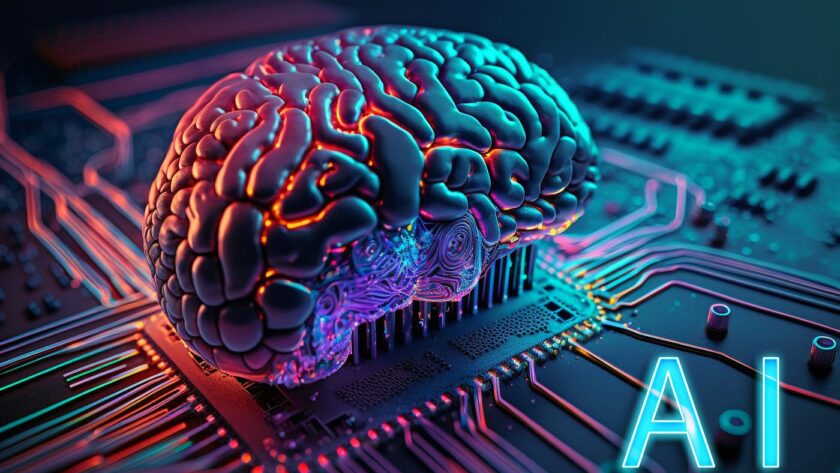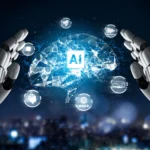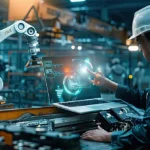Artificial Intelligence (AI) is one of the most profound technological advancements in modern history. From its humble beginnings in computer science research to its current state of rapid innovation, AI is transforming not only the way we interact with technology but also how we live and work. As AI continues to evolve, its impact is felt across every sector, from healthcare and finance to education and entertainment. In this article, we will explore how AI is shaping the future of technology, the challenges it presents, and how it’s revolutionizing industries across the globe.
Understanding Artificial Intelligence
AI refers to the simulation of human intelligence processes by machines, particularly computer systems. These processes include learning (the acquisition of information), reasoning (the use of information to make decisions), and self-correction. AI technologies often rely on machine learning (ML), a subset of AI that enables systems to improve their performance over time through experience.
The evolution of AI has led to several categories, such as narrow or weak AI, which is designed to perform a specific task, and general or strong AI, which is a hypothetical system that could perform any intellectual task that a human can do. However, it is the development of narrow AI, with applications in real-world scenarios, that is driving technological change today.
How AI is Transforming Various Sectors of Technology
1. Healthcare and Medicine
AI is making groundbreaking advancements in healthcare, from predictive diagnostics to personalized treatments. Machine learning algorithms can analyze vast amounts of medical data, such as patient records, medical images, and genetic information, to detect patterns that humans might miss.
- Medical Imaging: AI-powered tools can assist radiologists by identifying abnormalities in medical images like MRIs, X-rays, and CT scans with remarkable accuracy. AI systems, such as IBM Watson Health, are already being used to analyze medical images and assist with diagnoses of diseases like cancer, heart disease, and neurological conditions.
- Drug Discovery: AI models can simulate the interactions of different molecules, accelerating the process of drug discovery and reducing the time it takes to bring life-saving medications to market. AI algorithms are already helping pharmaceutical companies identify promising compounds for further testing.
- Personalized Medicine: AI can process genetic data to create personalized treatment plans tailored to an individual’s unique genetic makeup, improving the effectiveness of treatments and minimizing side effects.
2. Finance and Banking
In the financial sector, AI is revolutionizing everything from fraud detection to investment strategies. AI systems can analyze market trends and consumer behavior, making financial processes more efficient, secure, and accurate.
- Fraud Detection: AI-powered algorithms can spot unusual patterns in transactions, helping banks prevent fraudulent activities in real time. By analyzing transaction data, AI can flag potentially fraudulent transactions faster than human employees.
- Robo-Advisors: AI is powering robo-advisors, which use algorithms to offer automated financial advice. These platforms analyze market trends, an individual’s financial situation, and goals to provide investment recommendations without the need for human advisors.
- Algorithmic Trading: AI has become a significant force in the world of high-frequency trading. By processing vast amounts of data in real time, AI can make split-second decisions that maximize returns on investments.
3. Education
The education sector is also witnessing the transformative potential of AI. Through personalized learning, AI is helping students learn at their own pace, providing tailored educational experiences that address their unique needs.
- Personalized Learning: AI systems can track individual students’ progress and learning styles, offering custom-tailored lessons and assessments. Tools like intelligent tutoring systems (ITS) provide students with real-time feedback and adjustments to their learning path, helping them achieve better results.
- Administrative Efficiency: AI can automate administrative tasks like grading and scheduling, allowing educators to spend more time focusing on teaching. AI tools can even predict when students are at risk of falling behind and provide early intervention strategies.
- Virtual Learning Assistants: Virtual assistants powered by AI can answer student questions, provide additional resources, and help with lesson planning, making education more accessible and efficient.
4. Autonomous Systems: Transport and Manufacturing
AI-powered autonomous systems are poised to reshape industries like transportation and manufacturing. Self-driving cars, drones, and robots are all examples of how AI can optimize logistics, transportation, and production processes.
- Autonomous Vehicles: Self-driving cars, trucks, and drones powered by AI are changing the way we think about transportation. AI systems in autonomous vehicles can process vast amounts of data from sensors and cameras to make split-second decisions on the road. These vehicles have the potential to reduce traffic accidents and revolutionize the delivery of goods.
- Manufacturing Automation: AI-driven robots in manufacturing are improving efficiency, reducing costs, and minimizing human error. AI in industrial automation helps monitor equipment performance, predict when machines need maintenance, and optimize production lines in real time.
5. Customer Service and Marketing
AI is transforming how businesses interact with customers, improving service, and personalizing marketing efforts. Chatbots, voice assistants, and recommendation engines are enhancing user experience.
- Chatbots and Virtual Assistants: AI-powered chatbots and virtual assistants like Amazon’s Alexa and Apple’s Siri are becoming integral parts of customer service. These tools use natural language processing (NLP) to understand and respond to customer queries, reducing wait times and improving satisfaction.
- Personalized Marketing: AI helps marketers deliver highly personalized content and advertisements. By analyzing consumer behavior and preferences, AI algorithms can recommend products, send personalized offers, and even optimize pricing strategies based on demand.
6. AI in Creativity: Art, Music, and Design
AI is even making waves in creative fields, helping artists, designers, and musicians push boundaries and enhance their work.
- AI in Art: AI algorithms are being used to generate unique pieces of artwork. Programs like DeepArt and Google’s DeepDream can create original pieces by analyzing existing artworks and learning the patterns of different artistic styles.
- AI in Music: AI can compose original music by learning from existing songs. Tools like Amper Music and OpenAI’s MuseNet use deep learning to compose music in various styles, offering a unique tool for musicians and producers.
- Design and Fashion: AI tools are used in design software to assist with generating patterns, optimizing designs, and even predicting future fashion trends based on consumer data.
Challenges of AI Adoption
Despite its many benefits, the widespread adoption of AI comes with challenges. Ethical concerns, data privacy issues, and potential job displacement are some of the issues that need to be addressed as AI continues to develop.
- Ethical Dilemmas: AI systems make decisions based on the data they are trained on, which can sometimes reflect biases present in the data. This can lead to unfair or discriminatory outcomes, especially in areas like hiring, law enforcement, and lending.
- Job Displacement: As AI systems become more capable, there are concerns about job loss, particularly in industries that rely heavily on routine tasks. While AI creates new opportunities, the transition may be difficult for workers who need retraining.
- Data Privacy and Security: AI systems often require large datasets to function effectively, raising concerns about how personal data is collected, stored, and used. Ensuring that AI technologies respect privacy while remaining effective is a key challenge.
FAQs on AI Transformation
1. What is AI, and how does it work? AI refers to systems designed to simulate human intelligence, using algorithms and data to make decisions, learn, and improve over time. It works through machine learning, where systems analyze data to identify patterns and make predictions.
2. What industries are most affected by AI? AI is transforming industries such as healthcare, finance, education, manufacturing, and transportation, among others.
3. How can AI help in healthcare? AI assists in diagnosing diseases, discovering drugs, and providing personalized treatment plans based on an individual’s data.
4. Is AI a threat to jobs? While AI may lead to job displacement in certain sectors, it also creates new opportunities in tech, data science, and AI development.
5. What are the risks associated with AI? AI poses risks such as bias in decision-making, privacy concerns, and ethical dilemmas in areas like law enforcement and hiring.
6. How does AI improve customer service? AI-powered chatbots and virtual assistants can provide real-time responses, personalize user experiences, and handle customer queries 24/7.
7. Can AI be creative? AI is being used to generate art, music, and design, demonstrating its potential to assist and enhance human creativity.
Conclusion
AI is transforming the future of technology in ways we are only beginning to understand. From improving healthcare outcomes to enhancing customer service, AI is driving innovation across industries. However, the rapid growth of AI also brings challenges, including ethical concerns, data privacy issues, and the potential for job displacement. It’s crucial to address these challenges responsibly to ensure that AI’s benefits can be maximized while minimizing its risks.
Key Takeaways
- AI is revolutionizing industries such as healthcare, finance, education, and entertainment by enhancing efficiency, improving personalization, and driving innovation.
- AI’s impact extends to customer service, autonomous systems, and even creative fields, opening up new possibilities for businesses and individuals.
- Ethical concerns, job displacement, and privacy issues must be addressed as AI continues to evolve.
- The future of AI holds enormous potential, but its growth must be managed responsibly to ensure it benefits society as a whole.




